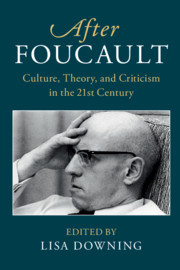Book contents
6 - Foucault and Queer Theory
from Part II - Coming After Foucault
Published online by Cambridge University Press: 30 May 2018
Summary
In A Dialogue on Love, ‘love’ was the word Eve Kosofsky Sedgwick offered for a queer experiment about being with others. ‘Queer stuff’, she wrote, is ‘like a big dare’,
also like a big
allegory about love.
Experimental.
And at least to me
metamorphic (which is how
I recognize love.)
This metamorphic experiment in love was also a mode of knowing that offered
some vitally
transmissible truth
or radiantly heightened
mode of perception
and ‘if you lose the thread of this intimacy both your soul and your whole world might subsist forever in some desert-like state of ontological impoverishment’. The queer love whose theory Sedgwick helped to invent included a politics whose aim was not state recognition or the registration of couples into the archives of marriage. In its athwart relation to regulatory norms and sexual identity itself, Sedgwick's queer love was deeply Foucauldian. As Sedgwick put it in Epistemology of the Closet, she took the ‘results’ of ‘Foucault's demonstration’ of the problematic privileging of sexuality in modern Western culture as nothing less than ‘axiomatic’.
Foucault's cruel exposure of sexual minorities’ attachment to the same identity-based structures their claims for freedom sought to contest became axiomatic not only for Sedgwick but also for subsequent generations of queer theorists. As Shannon Winnubst and Jana Sawicki put it in their introduction to a 2012 special issue of Foucault Studies on Foucault and queer theory, queer theorists pursued a ‘“slantwise” and eccentric position within particular socio-cultural frames’. Winnubst and Sawicki's description of queer theory over the past three decades describes a proliferation of Foucault-inspired projects that move far beyond the subjects covered in Foucault's writings. ‘The first generation of so-called “queer Foucauldians”’, they note, ‘were quite distinct in outlook and approach’. However, subsequent ‘queer theoretical projects expanded to include a diverse constituency: trans people, postcolonial queers, and queers of color’. They conclude that this later ‘diversity’ in queer thought ‘seemed fitting given Foucault's assertions that his work constituted not a theory or ideology, but a set of tools that he hoped others might find useful in their struggles against unnecessary constraints on freedom’.
- Type
- Chapter
- Information
- After FoucaultCulture, Theory, and Criticism in the 21st Century, pp. 93 - 106Publisher: Cambridge University PressPrint publication year: 2018
- 1
- Cited by

